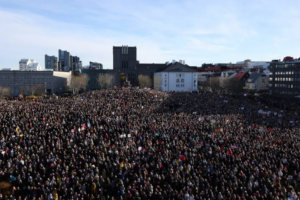Women in Iceland Go on Strike Against Gender Inequality
Originally published by Isabella Kwai and Jenny Gross for The New York Times
Tens of thousands of women and nonbinary people in Iceland were expected to join a one-day strike on Tuesday, which organizers called the country’s largest effort to protest workplace inequality in nearly five decades.
Iceland is a global leader in gender equality but still has a long way to go, said Freyja Steingrímsdóttir, a spokeswoman for the Icelandic Federation of Public Workers, the country’s largest federation of public worker unions.
“Iceland is often viewed as some sort of equality paradise,” Ms. Steingrímsdóttir, an organizer of the strike, said. “If we’re going to live up to that name, we need to move forward and really be the best we can be — and we’re not stopping until full gender equality is reached.”
Organizers urged women and nonbinary people to stop all work on Tuesday, including household errands and child care. Even Prime Minister Katrín Jakobsdóttir said she would take part, telling local news media that she would not call a cabinet meeting and that she expected other women in the cabinet to strike.
Alongside gender wage and pay parity, the protest will also highlight the problem of violence against women. “The struggle for equality has not resulted in less gender-based violence,” said Drífa Snædal, a strike organizer and a spokeswoman for Stígamót, a counseling center for survivors of gender-based violence. “Women: Take the day off,” she added.
Tuesday’s strike, which would be Iceland’s seventh such action for gender equality in recent decades, is the first full-day strike since 1975, when 25,000 people rallied in Reykjavík to international attention. Schools and theaters shut, and the national airline canceled flights, since most of the flight attendants were women.
Iceland has made big strides toward gender equality. For the 14th consecutive year, the nation had the best overall score on the World Economic Forum’s Global Gender Gap Report, published in June. In 2018, Iceland put in place a new law that required companies and government agencies to prove that they were paying men and women equally.
But inequalities have persisted. Parity scores in wages and in representation among senior officials have slipped since 2021 and the numbers are now closer to 2017 levels, according to the World Economic Forum report. The wage gap, which refers to the difference between the median earnings of women relative to the median earnings of men, is 21 percent. A 2018 study from the University of Iceland on the effect of trauma on women’s health found that a quarter of women reported having been raped or having experienced sexual violence.
According to the Organization for Economic Cooperation and Development, the gender wage gap in Iceland is wider than the gap in Belgium and Italy, but far narrower than in Britain, Germany, the United States and Japan. Europe has the highest gender parity of all regions, the World Economic Forum report found.
As in other countries, Tatjana Latinović, president of the Icelandic Women’s Rights Association said that women in Iceland were more likely than men to take on the physical and mental load of household chores and child care. Even if that labor was outsourced, it was to predominately female workers, she said. “Do you call this equality?” she said, invoking the slogan for the strike. “We have not reached complete equality if it is not for us all.”
